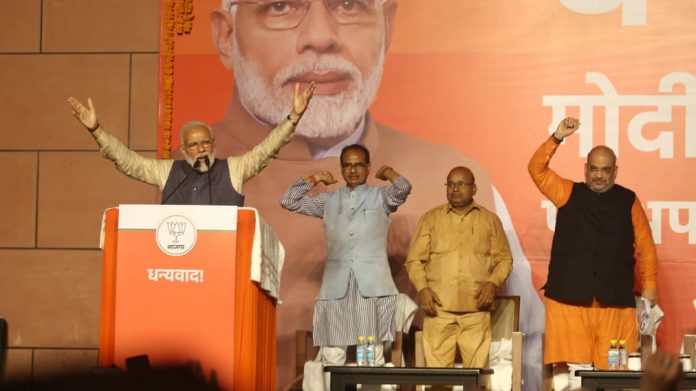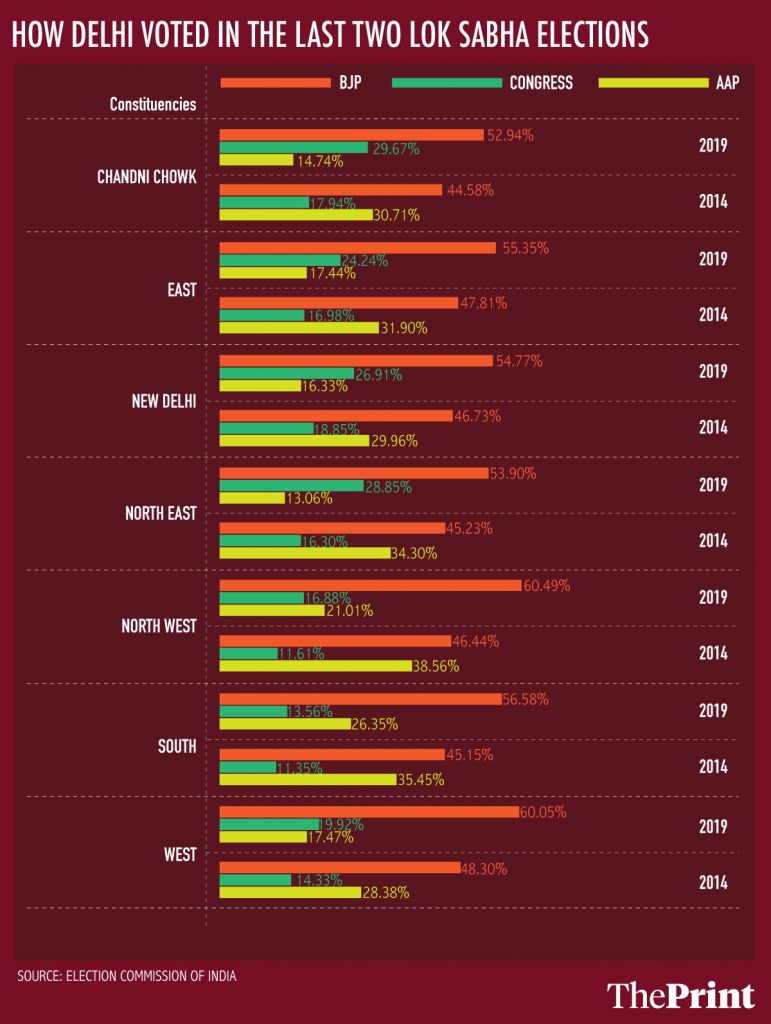
New Delhi: There was no stopping Narendra Modi’s Bharatiya Janata Party (BJP) in Delhi even if the Aam Aadmi Party (AAP) and the Congress had forged an alliance.
The combined vote-share of these two parties was less than that of the BJP in each of the seven seats in the national capital territory, an analysis of the Lok Sabha results showed.
The overall vote-share of the BJP in Delhi stood at 56.6 per cent, while the Congress won 22.5 per cent and the AAP, 18.1 per cent.
The AAP was the biggest loser in this election as both the BJP and the Congress increased their vote-share at the cost of Delhi’s ruling party.
For instance, in North East Delhi, BJP’s Manoj Tiwari got 7.9 lakh votes, while the combined votes of Congress candidate Sheila Dikshit and AAP’s Dilip Pandey totalled 6.1 lakh.
Tiwari’s vote-share was 53.9 per cent, while the total for Delhi’s former chief minister and Pandey stood at 41.01 per cent, according to Election Commission (EC) data.
Similarly, in New Delhi, BJP candidate Meenakshi Lekhi got 5.04 lakh votes, against a combined total of approximately 4 lakh for Ajay Maken of the Congress and Brijesh Goyal of the AAP.
In five seats, the AAP was pushed to a distant third, a far cry from its spectacular 2015 victory when it won 67 of Delhi’s 70 assembly seats. The only seats where it stood second were South Delhi and North West Delhi.
‘BJP vs Congress’
This election marked a second successive golden run for the BJP, which also won all of Delhi’s seven seats in 2014.
A closer look at EC data points to the fact that in this election AAP’s 2014 vote-share on all seven seats got split between the Congress and the BJP, with the former benefiting more.
For instance, in North East Delhi, the AAP had a vote-share of 34.3 per cent in 2014, which is now down to 13.06 per cent. The Congress vote-share, meanwhile, increased by 12.55 percentage points, and that of the BJP by 8.67 percentage points.
In Chandni Chowk, where the BJP fielded Harsh Vardhan against the Congress’ Jai Prakash Agarwal and the AAP’s Pankaj Gupta, the vote-share of Arvind Kejriwal’s party was down by 15.74 percentage points over 2014. The Congress’ vote-share, on the other hand, went up by 11.73 percentage points and the BJP’s by 8.36 percentage points.

“It is a major loss, as we were expecting to win at least 1-2 seats. But, at the same time, our vote-share has increased,” a senior Congress leader said.
“The results have made it clear that, in Delhi, it’s a fight between the BJP and the Congress. We will analyse the results and strategise for the assembly elections due next year,” the leader added.
After feverish speculation over a possible alliance between the Congress and the AAP, the former went solo after disagreements over certain conditions put forth by Delhi’s ruling party.
Flirting with the ‘enemy’
The AAP has its origins in social activist Anna Hazare’s 2011 anti-corruption agitation against then Congress-led UPA government at the Centre, but the two parties have flirted with the idea of a tie-up before as well.
Talks for an alliance for the 2019 Lok Sabha polls fell through after the AAP insisted on a pact in Haryana along with the one being discussed for Delhi.
Even though a number of senior Congress leaders, including party president Rahul Gandhi, had favoured an alliance with the AAP in Delhi, the party’s state unit was against it.
Dikshit has vehemently opposed the move in the past too.
In 2014, the AAP fielded 432 candidates in the Lok Sabha elections, winning four of 13 parliamentary seats in Punjab.
While it failed to open its account in the national capital, the party’s vote-share doubled to around 54.3 per cent by the time it contested the 2015 Delhi assembly elections.
The subsequent decline in its fortunes, however, was visible in the 2017 Delhi municipal elections, where the AAP’s vote-share fell to 26.23 per cent even as the Congress’ rose to 21.09 per cent.
Get the PrintEssential to make sense of the day's key developments